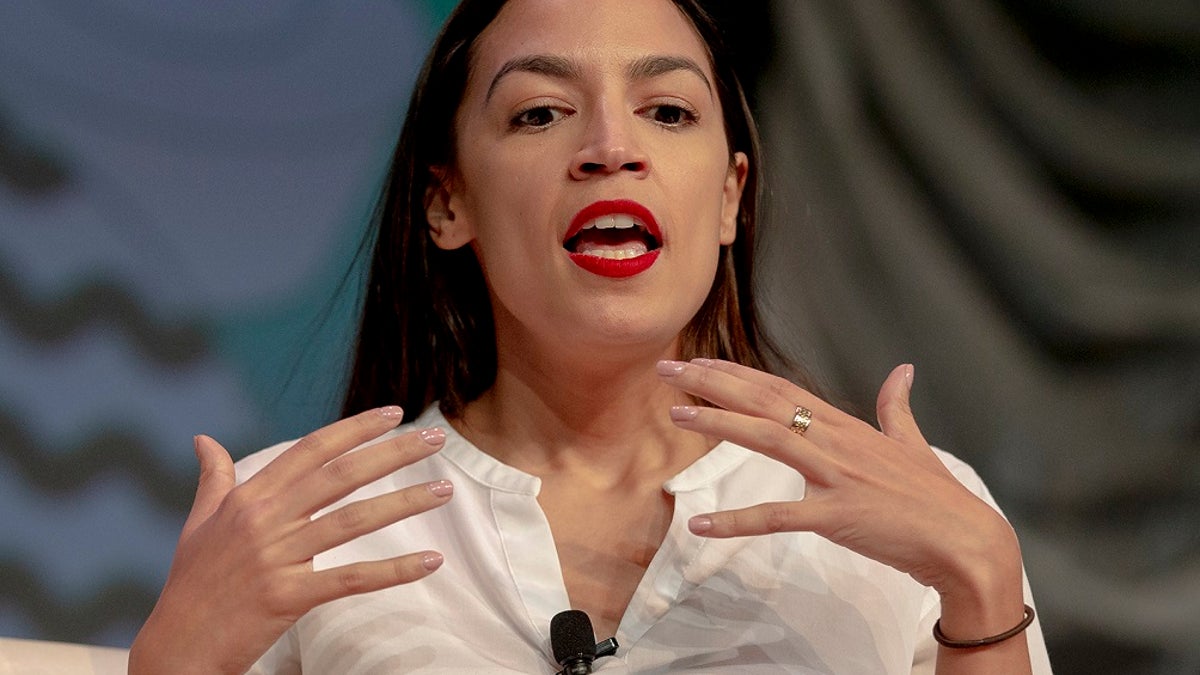
Rep. Alexandria Ocasio-Cortez, D-New York, speaks during South by Southwest on Saturday, March 9, 2019, in Austin, Texas. (Nick Wagner/Austin American-Statesman via AP)
As our country has prospered, the economic system that has brought it that prosperity—capitalism—has come under attack. And, as far-left candidates are gearing up for 2020, the rhetoric against capitalism is only increasing. But, despite the cries of these critics and their supporters, there’s nothing wrong with capitalism—people are just hypocrites, unwilling to wield their own power in the market by “voting with their wallets” in a manner consistent with their words.
As opposed to a centrally, government-planned system like socialism, where a small number of elites control the means of production and decide how to allocate scarce resources, capitalism is an extremely complex but efficient system where resources are allocated based on the behaviors of all of the participants in the market. Real wants and needs influence prices, incentives, efficiency and what goods and services are ultimately produced and provided. As no set of people could possibly have the knowledge to understand all the complexities that go into the market as a whole, it is no surprise that the closer to a free market system an economy becomes and the further away from socialism it moves, the more prosperity that’s created. It’s why the U.S. is the world’s leading economy and why economies like India and China show growth every time they allow free market elements to come into their otherwise planned economies.
NEW POLL SAYS OCASIO-CORTEZ IS WELL KNOWN BUT MOSTLY DISLIKED ACROSS THE COUNTRY
Yet every day, we hear some complaint about capitalism. Congresswoman Alexandria Ocasio-Cortez, D-N.Y., a self-described democratic socialist, was outraged at the prospect of Amazon coming to New York City, given the incentives they were getting and her disdain regarding their business practices. On February 1, she tweeted, “Nothing Amazon has said or done - including selling facial recognition technology to ICE & its intent to fight against worker unionization - would lead us to believe it could be a good or healthy neighbor for NYC.” Two weeks later, she tweeted, “Is that culture of ‘strict performance’ why Amazon workers have to urinate in bottles & work while on food stamps to meet ‘targets?’ ‘Performance’ shouldn’t come at the cost of dehumanizing conditions. That’s why we got rid of sweatshops.”
If consumers’ actions matched their words, they would be leveraging the essence of the free market.
Given this vehement outrage against the company, one would assume that she would never want to be Amazon’s patron. I’m not talking about any sort of organized boycott or coordinated effort, I am talking about the power of each and every individual to affect the free market by choosing where to spend their money and offer their support. Voting with your dollars directs more resources, profits and wealth to a company. However, for AOC’s own 2018 congressional campaign, FEC disclosures show almost 70 different disbursements her campaign made to both Amazon Web Services and Amazon.com, including expenses for “chalk,” “pens” and general “office supplies” – all of which could have ostensibly been made at a local small business to support her local economy. She even bought a “Prime” membership, according to those disclosures; hardly behavior of someone who found Amazon so abhorrent in their actions.
But, politicians aren’t the only ones who are hypocritical. There has been recent outrage at Google* for being too big and powerful, leading to calls for it to be broken up. But, how many people do you know who go to DuckDuckGo for their web searches instead of Google? It takes the same amount of time to do an Internet search using each platform, but Google ends up being the default consumer action.
We see the same behavior regarding Facebook* and its various privacy issues. While some people deleted their accounts, many only did so on Facebook and not on the Instagram platform (also owned by Facebook); and those who took action were a tiny fraction of overall users. In fact, according to the most recent Facebook 10-K filing, daily active users averaged 1.52 billion and monthly active users averaged 2.32 billion for December 2018, which was actually up 9 percent for both metrics year-over-year.
Despite its trust-violating actions of opening fake accounts and charging fees, Wells Fargo today, according to their most recent 10-K filing, still has $1.9 trillion in assets and services one in three households in the United States. Customers apparently just don’t care enough about their past behaviors to vote with their wallets and take their business elsewhere.
If consumers’ actions matched their words, they would be leveraging the essence of the free market. By not spending their dollars or time with companies that they didn’t value, those companies would be forced to change or be put out of business, if the companies were salvageable at all. The vote of their wallet would instead direct dollars (or time, etc.) towards companies that aligned with the important values of consumers, whether it be privacy or worker conditions or other values.
CLICK HERE TO GET THE FOX NEWS APP
But, the reality is that consumers don’t care enough. While they like to complain, they consistently show that they value the convenience of Amazon. They give up their privacy many times a day and it’s not really a priority. They may scream for government intervention only because they are too lazy or happy with their existing lives to make these small changes themselves, which are entirely within their control.
And in the end, the market is working exactly as it should. The market doesn’t need fixing. It’s the consumer that’s broken.
*Denotes that the author has a holding in the securities of these companies.








































